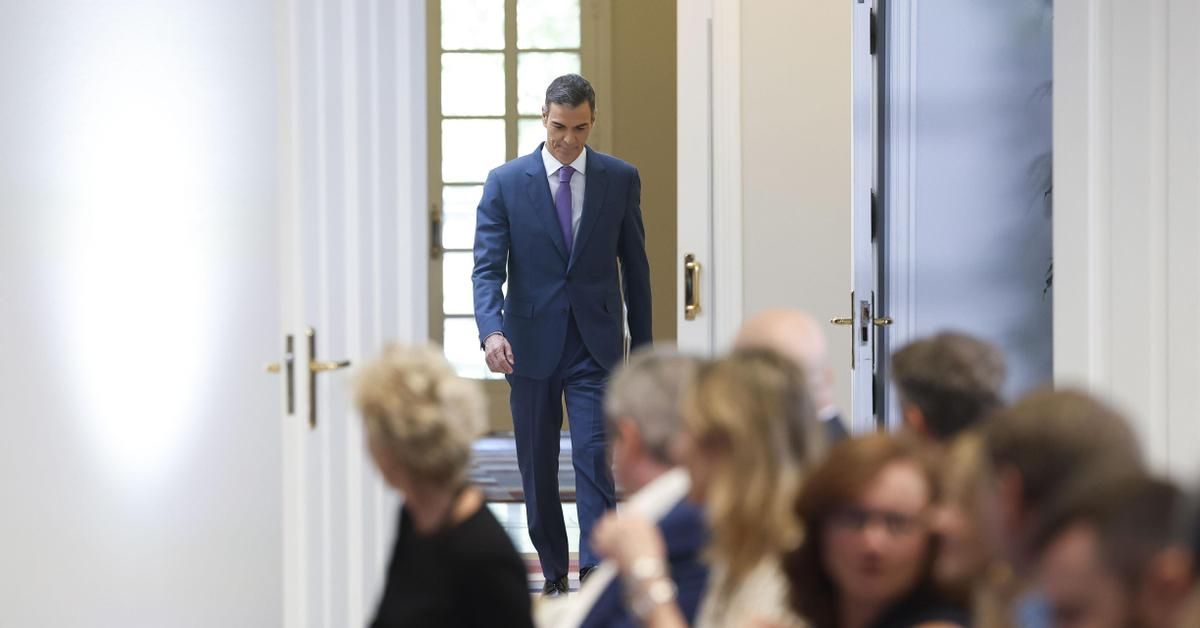
Sánchez Resist and Feijóo despairs. Government and opposition closing until the end of August to return, surely, just as they left. One, willing to continue despite its weakened majority and with plans to advance. The other, with an eye on elections that yearns, but do not arrive and with the purpose of demolishing Sanchismo. September predicts, in any case, the same noise and the same opposition strategy without barracks against a president who leaves the negotiation of the general budgets by 2026 and the possible changes in his cabinet to face the second half of the mandate.
In La Moncloa they prepare for the start of the new proposals of social nature and in anti -corruption matters that force the PP to be portrayed before an electorate that “if something recognizes in all the qualitative ones is that the great social advances always came from the leftist governments,” says a socialist minister. The Government tries to pass the drink of the crisis open after the imprisonment of the former secretary of Organization, Santos Cerdán, and the judicial investigation on the corrupt plot that operated in the Ministry of Transportation during the years of José Luis Ábalos as Minister. And the objective, ensure presidential cabinet sources, is to take advantage of September to resume the social agenda and promote a package of social measures that serve to cohes the partners Parliamentarians.
Approved already in July, as Yolanda Díaz demanded, the extension in three weeks of the permits paid for paternity and care, the socialists intend to advance in their historical proposal for the abolition of prostitution as a gesture of self -affirmation after the deplorable audios that They revealed how Ábalos, and his advisor Koldo García hired prostitution services with derogatory references towards women. An issue that the right has used to question the commitment of the Socialists with feminism, as Feijóo himself did last Thursday in his end of course balance, where he came to affirm that prostitution “came well [a Sánchez] In the personal and patrimonial sphere “during” an era of his life. “The opposition leader took another step, after having accused the president of” having participated in a lucrative basis “of prostitution, alluding to an alleged saunas business of his deceased father -in -law.
The truth is that that of the abolition of prostitution is a proposal to add, a governing partner of the PSOE, has always had reservations. In fact, the last time the Socialists took a text to Congress to abolish prostitution was just over a year ago was lying with the votes of the PP and those of Yolanda Díaz. However, in their last Federal Congress of December 2024, the Socialists returned to ratify their commitment to abolitionism and their intention is to bring it to Parliament from September in a clear wink to feminism and the vote of women.
Likewise, the Government will also approve the reform of the tobacco law, which will include the expansion of smoke -free spaces such as hospitality terraces, university campuses, teaching centers, sports facilities and external leisure areas. The text, which was planned to take to the last Council of Ministers of July, establishes a new regulation for electronic cigarettes, nicotine bags and other products based on heated herbs, which will be normatively equated to conventional tobacco in terms of restrictions on use in public spaces. And it is that the Ministry of Mónica García has proposed “guaranteeing safe and healthy environments” from the conviction that “each space won to tobacco smoke is a space won to health and life.”
In addition to the expansion of smokeless spaces, the reform will be addressed within the framework of a broader national strategy to fight smoking, which will include the financing of smoking treatments from the National Health System, the regulation and control of new consumption devices, and the increase in taxation on products related to tobacco.
Sanchez also proposes to give legal form in the last quarter of the year to the measures he designed jointly with the Department of Anti -Corruption, Integrity and Government of the OECD to fight corruption and that he already announced in July in Congress during his appearance, after the entry into prison of Santos Cerdán. It is a state plan to fight corruption focused on crime prevention and strengthening corruption controls and including the creation of an independent public integrity agency. An organism that will assume key functions in the prevention, supervision and persecution of corrupt practices.
The Government also wants to demand compliance control systems in anti -corruption matters to the companies that hire with the different administrations and reinforce, on the other hand, the controls on the political parties “to ensure that those who manage public resources do so with the highest standards of transparency and integrity,” according to the government president himself. The objective is to also impose the obligation to carry out external and independent audits for the parties and their foundations with public financing exceeding 50,000 euros, as well as the reduction of the donation publication threshold to 2,500 euros and the publication deadline for a month from receipt.
El Greco and the regulation of lobbies
Corruption, as a consequence of Abalos/Koldan/Cerdán and Montoro cases has climbed in recent months until second place in the Spanish concerns list, according to the CIS. And the government tries to respond to it as soon as possible. Much more after this last week of July, the Greco (group of states against corruption) of the Council of Europe has warned Spain that it has not complied with its recommendations on the regulation of political advisors or on the reform of the figure of the aforement. In the same report, that the PP once again used to request early choices, regrets that regulation to interest groups or lobbies has not yet materialized.
Although Greco admits that the Government has taken some steps in anti -corruption matters with the so -called Action for Democracy Plan, it also indicates that Spain should “intensify its efforts” to implement reforms that allow reinforcing the anti -corruption mechanisms in the high instances of the government and in security forces. In this regard, he points out that the Council for Transparency and Good Government has gained greater independence although its full sanctioning capacity is still pending legislative approval. He also believes that employment restrictions for people who have served a political position, so -called ‘rotating doors’ and financial declaration requirements need to be reinforced. Specifically, with regard to independent supervision and publication of broken financial data. And he adds that the Office of Conflicts of Interest continues to lack true independence and its own budget.
“Spain,” says the document that was known last Friday, “has not applied satisfactorily nor has any of the 19 recommendations contained in the Quinta Ronda evaluation report”, which was published in 2019. Of all recommendations, the work group believes that 16 have been executed, but only “partially” while three others remain without applying, so the report concludes that the recommendations are not fulfilled Spanish authorities to present a report on the advances before June 30, 2026.
Source: www.eldiario.es

